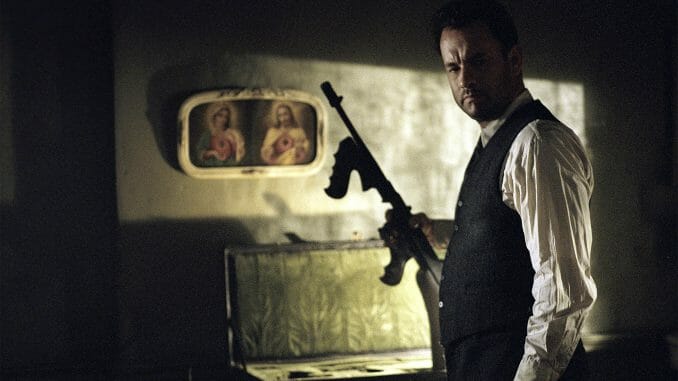Tom Hanks Used His Nice Guy Persona to Make Road to Perdition Soar

The decade following Tom Hanks’ second Oscar win, for 1994’s Forrest Gump, is arguably the most fascinating era of his career. It’s a period in which Hanks, who became just the second actor in history to win two consecutive Best Actor Oscars (Spencer Tracy was the first), could have done just about anything he wanted. He could have leaned hard into the transition from 1980s comedy star to Serious Actor, chosen his roles purely by their emotional weight and remained committed to chasing still more Academy Awards. He could have also swung into pure Nice Guy mode and used the rest of his career to delight and entertain without a smidgen of ambiguity.
What we got instead was proof of Hanks’ still-thriving versatility and near-constant sense of intellectual and artistic curiosity, a decade of roles that challenged him after his leading man prowess was honored two years in a row on the Academy stage. He did the Nice Guy movies, of course, following up Gump with the reliable Ron Howard re-team Apollo 13 and voiced everyone’s favorite stuffed cartoon cowboy in Toy Story. But Hanks also showed an interest in playing guys who were, if not evil, then at least not entirely pleasant. We saw a peek of it in That Thing You Do!, his glorious feature directorial debut, in which he co-starred as the unapologetically ambitious and sometimes manipulative record executive Mr. White. Then, with the help of Steven Spielberg, he took that movie star twinkle in his eye to the beaches of Normandy and gave us Saving Private Ryan’s devastated, haunted Captain John Miller—a man both committed to duty and willing to stray from the realm of moral absolutes if it means another day of survival on the battlefield.
Then came Road to Perdition.
In hindsight, Sam Mendes’ understated, heartbreaking saga of a father’s attempt to break the cycles of violence upon which he built his family feels like a natural evolution of Hanks’ work in films like A League of Their Own and Saving Private Ryan—really, even in Toy Story, with its study of the selfishness and ruthlessness shown by Sheriff Woody. After years of playing flawed but ultimately good men fighting to overcome the compromises of their lives, here was Hanks playing a man whose moral compass, or lack thereof, is the center of an entire narrative. Two decades later, it ranks among his most remarkable work, a performance that both fits into his wider career and serves as a stirring reminder that, any time he wants, Hanks can weaponize his place as America’s Resident Dad and use it for something darker.
The film opens with a question about Hanks’ Mike Sullivan, a mob enforcer in the 1930s Midwest who’s a dutiful husband and father, and a faithful servant to kingpin Tom Rooney (Paul Newman). Sullivan’s son Michael (Tyler Hoechlin) tells us that people are always asking him if Mike Sullivan was a good man or a bad man. It’s Mendes laying down the thematic gauntlet of the film, a film the title tells us will be about a journey into some kind of hell. Can a man still be good if he builds his life on sin, and if a bad man does one good thing before he dies, does he die a good man?
-

-

-

-

-

-

-

-

-

-

-

-

-

-

-

-

-

-

-

-

-

-

-

-

-

-

-

-

-

-

-

-

-

-

-

-

-

-

-

-








































